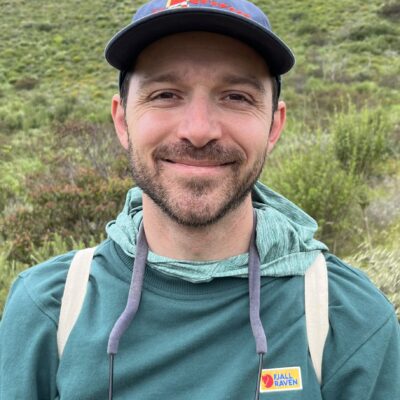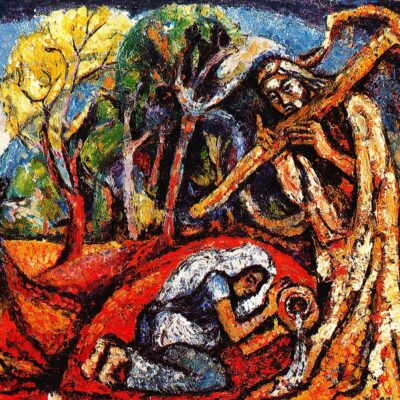+In the name of the Father and of the Son and of the Holy Spirit.
Just then a lawyer stood up to test Jesus. “Teacher,” he said, “what must I do to inherit eternal life?” He said to him, “What is written in the law? What do you read there?” He answered, “You shall love the Lord your God with all your heart, and with all your soul, and with all your strength, and with all your mind; and your neighbor as yourself.” And he said to him, “You have given the right answer; do this, and you will live.”
The lawyer asks, “Who is my neighbor?”
Jesus doesn’t answer him directly but tells him the parable of the Good Samaritan.
“A man is going down from Jerusalem to Jericho, from David’s city of peace, perched high on a hill, twenty miles through the wilderness, to Jericho, located at the edge of the Dead Sea. It is a dangerous road, not one to travel alone.” – James A. Wallace
It truly is a dangerous road, as he doesn’t make it to Jericho before being beaten, stripped and robbed, left for dead.
A priest walks by, moving to the far side of the road to avoid him.
A levite also walks by, moving to avoid him.
But then a Samaritan, the one who has nothing in common with the man, does the unthinkable and comes closer to him.
Cares for his wounds, transports him to the safety of an inn, and pays the innkeeper to care for him as he recovers.
After telling the parable, Jesus asks a final question, “Which of these three, do you think, was a neighbor to the man who fell into the hands of the robbers?”
This question and really the whole parable is upsetting to the lawyer and likely all who heard it because they knew that the only answer could be the Samaritan, but they didn’t want him to be his neighbor. So instead of identifying him as the Samaritan, the lawyer answers “The one who showed him mercy.”
He could have also said, the one who came near to him.
For that is what really separates the Samaritan from the priest and the Levite. He saw the man and came near to him.
In the wake of this week’s tragedies, I can’t help but also be upset by this parable. Because I have to confess that I would have to put myself in the place of one who passed by the man lying on the side of the road suffering.
For my entire life I have seen my Christian brothers and sisters of color being oppressed, beaten down by a racist social climate, and I have not said or done anything to change it.
I have let fear stand in the way.
Fear of not knowing what to do, and most importantly fear of losing my own privilege.
I allowed myself to believe that the Civil Rights Movement had ended racism. But for the past 10 years my eyes have been opened slowly. In my studies of public health, I was shown report after report how the societal racism in the United States negatively affects the health of people of color. I could no longer deny the fact that racism still existed. And I even started to see my own white privilege and understand my part in societal racism. I even acknowledged the fact that I am a racist because I haven’t actively or intentionally worked to end racism, but allow it to continue.
I have seen the wounded, and I continue to walk on by on my way to my high hill of privilege.
But recently it’s become harder and harder to just walk on by.
I usually get my news from social media, meaning the newspaper articles and tv news reports I see are posted on Facebook or Twitter. Technology has drastically changed how I see the world. Everything is instantaneous, less curated, and more opinionated. It has opened my eyes to events I would have been unlikely to witness otherwise. I have been witness to the last moments of peoples lives, people I don’t know, but that are instantly made known to me as children of God as their lives are being taken from them. If it weren’t for cell phone video, I probably would have never known the names of Alton Sterling or Philando Castile. They would have been just 2 of the estimated 136 black persons killed by police in America in 2016.
Now, it’s as if I’m not just seeing the lifeless body on the side of the road, but am seeing the robbery and beating taking place. I am seeing the destruction happen, not just the results, and I sit and watch until the body looks just like all the other bodies left on the side of the road. But now this body has a name. And each time I walk down the road, I remember that name. But I have just kept walking until now.
I can’t keep walking though. The young black men killed and the young black children who I don’t want to see killed have captured my spirit. It is time for me to stop. Time for me to stop and come near to those in need on this dangerous road we are on together.
And that’s the thing I hope you all get from this… we are on this road together. We need to come near to each other for safety. We need to be neighbors; we need to be lights to each other in this dark world.
Martin Luther King, Jr. is quoted as saying “Darkness cannot drive out darkness; only light can do that. Hate cannot drive out hate; only love can do that.”
This quote was lived out in this parish this week.
On Friday morning after a gunman ambushed the Dallas Police force at a peaceful Black Lives Matter protest, killing Lorne Ahrens, Michael Krol, Michael J. Smith, Brent Thompson and Patrick Zamarripa (Zah ma reepa) and injuring 5 other law enforcement officers and 2 civilians, I received a message on Facebook from Canon Britt inviting me to join a discussion that was taking place. As I went back and read through all the previous discussion, I saw that Jasen Frelot who will be joining us this summer for a short children’s ministry internship was gathering leaders of churches throughout Seattle and the greater area to come together to act out of radical love. He was asking that we would help contribute and join him in delivering flowers to all the Seattle Police precincts and to officers on the street with the message, “Our prayers for safety and peace on this painful day. With gratitude, love, and hope for a more just and peaceful future.” Over 30 churches joined the conversation and put this idea into action, spreading the reach throughout the greater Seattle area. Canon Britt went with two fellow ministers to deliver flowers to the North Precinct, and since I was working in Snohomish that day, I went during my lunch break and delivered a bouquet to their police department as well. The receptionist there thanked me for the gesture and let me know that the officers were really struggling with the emotion of the day. Throughout the day I would see posts on Facebook and Twitter about various churches delivering flowers. But it was seeing Jasen and his daughter Ruby handing out roses to officers on the street that allowed me to understand the incredible need for love in these moments.
In these moments where anger and sadness are more than appropriate, we can choose to instead spread love. Not just to the police officers mourning their fallen comrades, but people of color too. As Jasen said in a video post explaining why he choose to take these actions “We should have acted sooner, there is no excuse for not acting when our Brothers and Sisters in Christ are being killed.” He also said that he hoped that this day would “inspire [the churches that joined him on Friday] to no longer be silent in the face of oppression…There can never be enough images of white people and white churches, white progressives and white conservatives, and white people showing their support for black people and people of color.”
Jasen, you have inspired me. I will be there on the road with you, drawing near to those who are in need. Thank you for helping to call me closer to those lying on the side beaten and bruised. I hope that we all will draw nearer together in this time of pain and confusion, spreading the love of Jesus that is the only remedy to the evil of this world.
On the night Martin Luther King Jr. died, Bobby Kennedy said something that is truer even today “What we need in the United States is not division. What we need in the United States is not hatred. What we need in the United States is not violence and lawlessness but is love and wisdom and compassion toward one another and a feeling of justice toward those who still suffer in our country, whether they be white or whether they be black.”
Presiding Bishop Michael Curry reminded me in an address he gave on this week’s tragedies, that we have in our prayer books that we can use to help draw us closer to God and one another. If you would all turn to page 815 in the Book of Common Prayer and say with me the prayer For the Human Family (no. 3)
O God, you made us in your own image and redeemed us
through Jesus your Son: Look with compassion on the whole
human family; take away the arrogance and hatred which
infect our hearts; break down the walls that separate us;
unite us in bonds of love; and work through our struggle and
confusion to accomplish your purposes on earth; that, in
your good time, all nations and races may serve you in
harmony around your heavenly throne; through Jesus Christ
our Lord. Amen.



